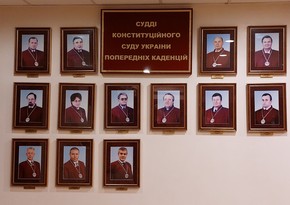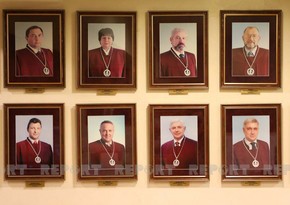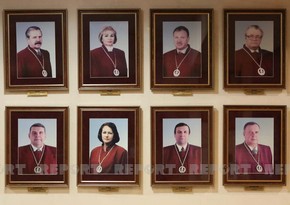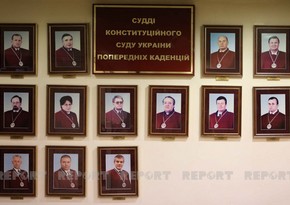В.о. Голови Конституційного Суду України: Я проти нової Конституції
Інтерв’ю виконувача обов’язків Голови Конституційного Суду України
Сергія Головатого східноєвропейському бюро Report
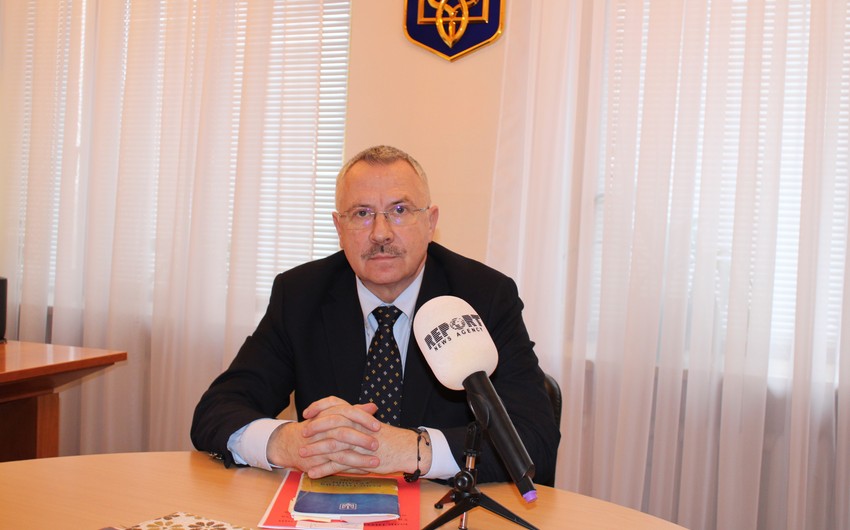 – Україна оголосила про початок масштабних реформ. Які міжнародні відносини використовуються при оновленні конституційних прав і конституційних реформ у цьому процесі?
– Україна оголосила про початок масштабних реформ. Які міжнародні відносини використовуються при оновленні конституційних прав і конституційних реформ у цьому процесі?
– Конституційний Суд – не учасник реформ. Оскільки Конституційний Суд – це інституція не політичного характеру, а судова, тому вона не може займатися політикою. І суд не здійснює жодної політики та не може бути учасником політичного процесу реформ. Саму Конституцію ми ухвалили через 5 років після розпаду СРСР, тобто 1996 року. Тоді політичний клас та інтелігенція були у фарватері радянського мислення та радянських знань. Тому, хоч і передбачили наявність такої інституції як Конституційний Суд під час ухвалення Конституції у 1996 році, йому відвели місце в розділі судової влади всупереч тому, що юрисдикція жодного відношення до судової влади не має. І ось лише через 20 років здійснили реформу судової влади, і Конституційний Суд було виведено з системи звичайного правосуддя. Зараз він посідає окреме місце в системі органів влади і не належить ані до законодавчої, ані до виконавчої, ані до судової гілок влади. Отже, Конституційний Суд – це особлива юрисдикція, що здійснює контроль над діяльністю політичних інститутів влади – президента, парламенту, уряду, а також від 2016 року опосередковано контролює якість продуктів судової влади: за конституційною юрисдикцією Конституційному Суду тоді було надано нове повноваження – розглядати індивідуальні скарги громадян стосовно порушення їхніх прав саме у тих випадках, коли вони вважають, що судова влада у всіх інстанціях їх не захистила. Отже, Конституційний Суд України був реформований, його незалежність було посилено, інституційно він був відокремлений від судової влади, набув більше можливостей у переліку повноважень конституційної юрисдикції, відповідно до цих повноважень здійснює свою діяльність, не беручи участі в жодних реформах політично.
– Минулого року Україна ухвалила свою нову економічну стратегію національної безпеки, в якій наголошено на необхідності того, щоб відносини з 5 країнами, у тому числі і з Азербайджаном, були на рівні стратегічного партнерства. Яку роль у цій співпраці відіграє конституційна діяльність?
– Конституційні суди більше працюють у межах регіонального співробітництва. Ми належимо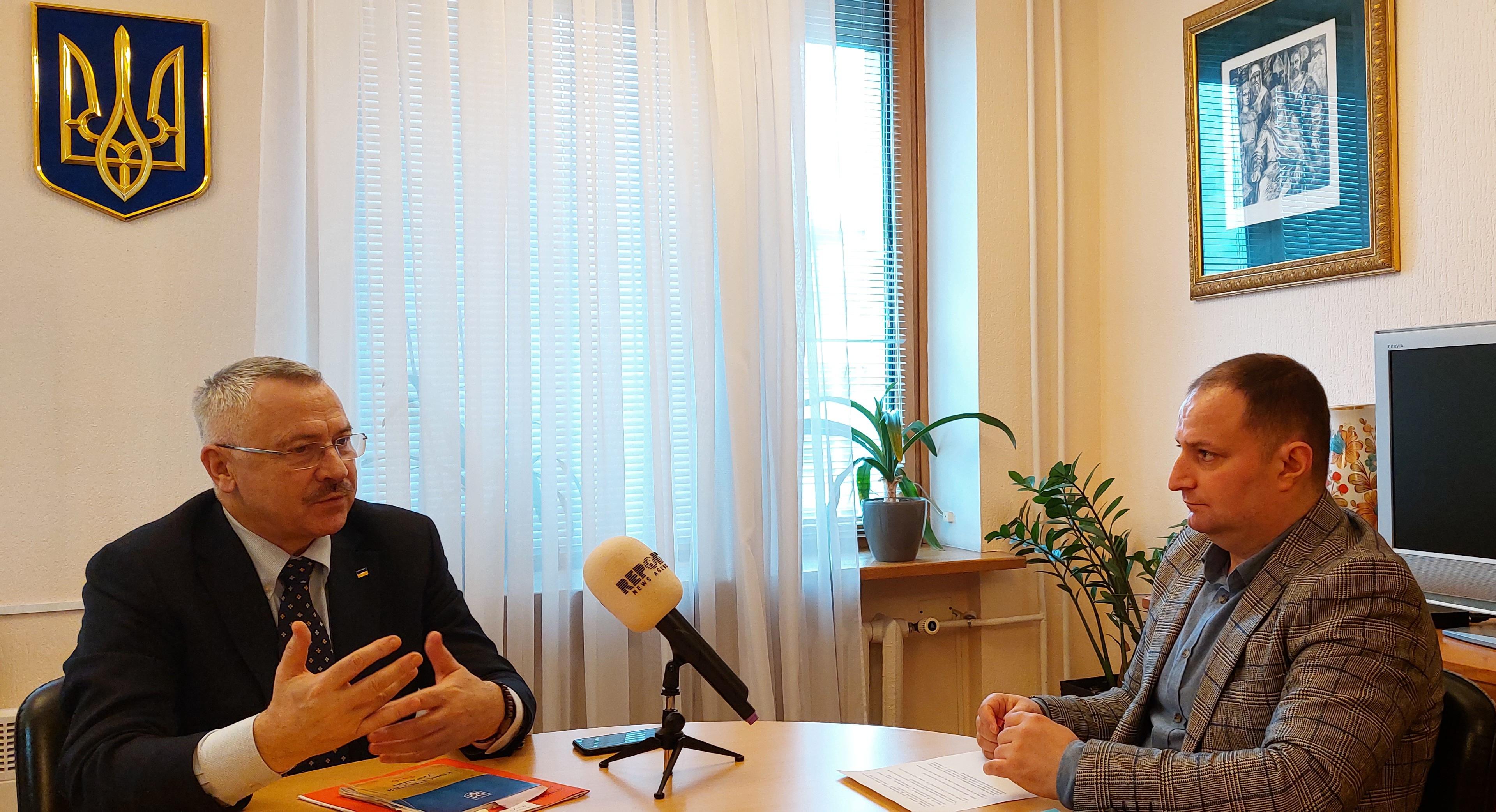 до Європейської конференції конституційних судів. У межах цієї структури відбувається обмін досвідом між національними судами, і ми маємо можливість щось запозичувати. У будь-якому разі, співпраця більше йде через європейську структуру, ніж на двосторонній основі. Кожна країна має свою конституцію, і кожна зі сторін захищає свою конституцію.
до Європейської конференції конституційних судів. У межах цієї структури відбувається обмін досвідом між національними судами, і ми маємо можливість щось запозичувати. У будь-якому разі, співпраця більше йде через європейську структуру, ніж на двосторонній основі. Кожна країна має свою конституцію, і кожна зі сторін захищає свою конституцію.
З Конституційним Судом Азербайджану ми розпочали співпрацю ще у 1999 році. Були регулярні зустрічі в Україні та в Азербайджані. У 2010 році Голова Конституційного Суду України Юрій Баулін брав участь у заходах, присвячених 15-річчю Конституційного Суду Азербайджану. Він вручив Конституційному Суду Азербайджану почесну грамоту Конституційного Суду України за внесок у розвиток наших відносин. А у 2015 році Конституційний Суд Азербайджану підтримав Конституційний Суд України, коли відбулося засідання голів конференції європейських Конституційних судів у Батумі. І тоді Конституційний Суд України запропонував ідею ухвалення декларації щодо охорони територіальної цілісності своїх держав. Потім було зроблено спільну заяву, яка підкреслювала, що Конституційні суди не повинні залишатися байдужими, коли йдеться про захист демократичного правопорядку тощо. До цієї заяви приєдналися Литва, Польща, Молдова, Кіпр і Азербайджан.
– Із яких питань до Конституційного Суду України надходить найбільше скарг?
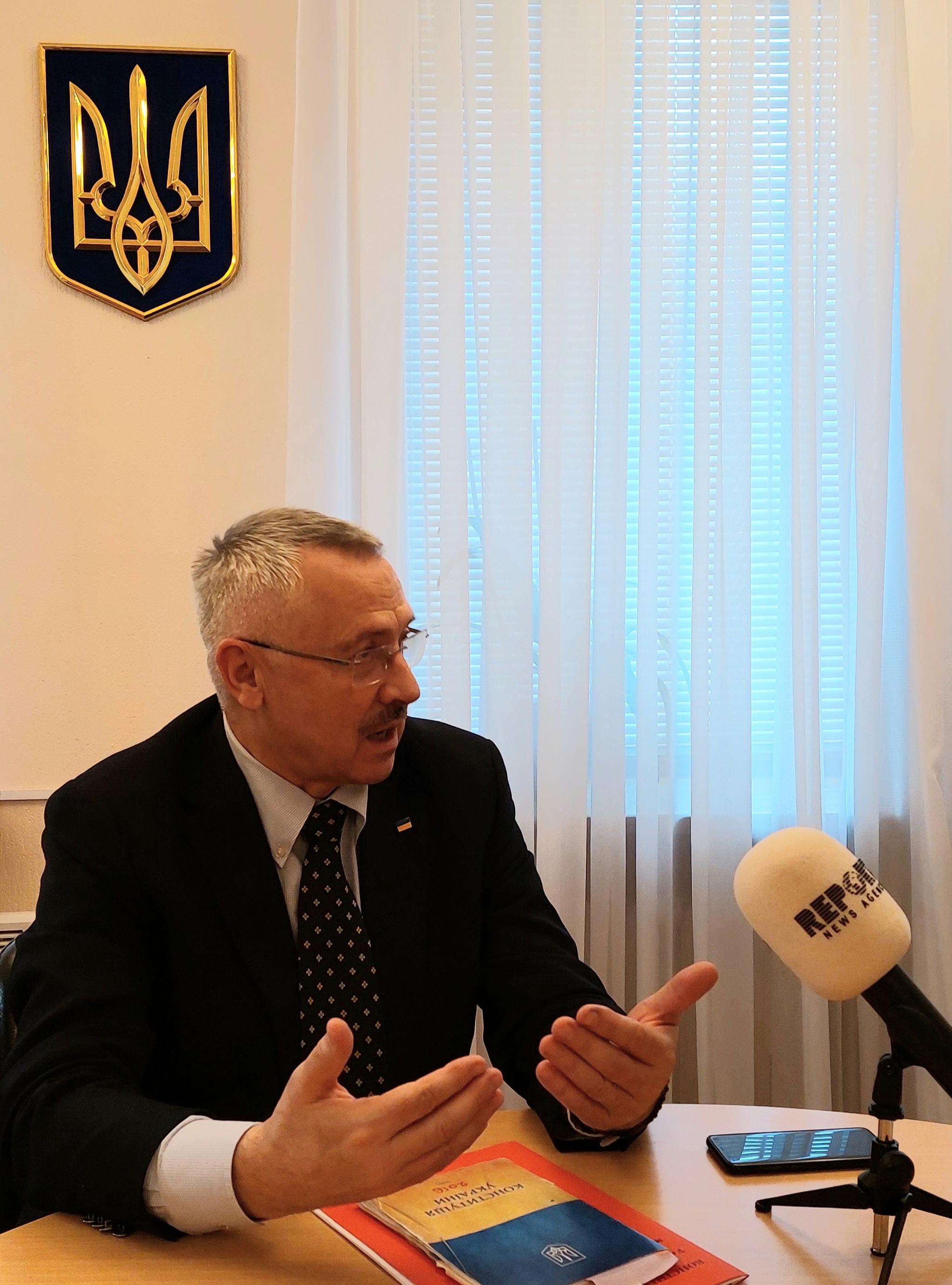 – Виходячи зі своїх спостережень, можу сказати, що найбільше скарг надходить у сфері соціального захисту, особливо в галузі пенсійного забезпечення. Конкретно це стосується осіб з інвалідністю, які постраждали внаслідок Чорнобильської катастрофи. Законодавець часто змінював рівень соціального захисту (розмір допомоги таким особам), тому вони шукали захисту в нас. У деяких випадках внесення законодавчим органом змін, що спричиняють зниження соціального захисту особам з інвалідністю, є порушенням Конституції. Багато в чому конституційна скарга була успішною для цієї категорії громадян, ми змогли захистити осіб з інвалідністю: після нашого рішення законодавчий орган певною мірою збільшив пенсію чорнобильцям. Водночас до нас звертаються не лише особи з інвалідністю, а й держслужбовці, чиновники, прокурори, яких не влаштовує розмір пенсій. Не дуже розмежовуючи галузі, маю сказати, що за кількістю звернень на другому місці стоять скарги на порушення прав людини у зв'язку із застосуванням судами норм процесуальних кодексів.
– Виходячи зі своїх спостережень, можу сказати, що найбільше скарг надходить у сфері соціального захисту, особливо в галузі пенсійного забезпечення. Конкретно це стосується осіб з інвалідністю, які постраждали внаслідок Чорнобильської катастрофи. Законодавець часто змінював рівень соціального захисту (розмір допомоги таким особам), тому вони шукали захисту в нас. У деяких випадках внесення законодавчим органом змін, що спричиняють зниження соціального захисту особам з інвалідністю, є порушенням Конституції. Багато в чому конституційна скарга була успішною для цієї категорії громадян, ми змогли захистити осіб з інвалідністю: після нашого рішення законодавчий орган певною мірою збільшив пенсію чорнобильцям. Водночас до нас звертаються не лише особи з інвалідністю, а й держслужбовці, чиновники, прокурори, яких не влаштовує розмір пенсій. Не дуже розмежовуючи галузі, маю сказати, що за кількістю звернень на другому місці стоять скарги на порушення прав людини у зв'язку із застосуванням судами норм процесуальних кодексів.
– Пане Сергію, як ви вважаєте, чи захищені повною мірою конституційні права громадян України? Чи є проблеми? Якщо є, то які?
– Проблема полягає в тому, щоб якісно розглянути скаргу й ухвалити справедливе рішення. Я не можу давати оцінку юридичній системі загалом. У 2016 році в результаті реформи в Україні було запроваджено новий інститут індивідуальної конституційної скарги. Минуло лише 5 років, і ми намагаємося самотужки досягти свого розвитку, вивчати те, на ґрунті чого ми ухвалюємо рішення. Так, наприклад, ми вивчаємо практику Федерального конституційного суду Німеччини. Це один із найстаріших судів, чиї напрацювання у сфері матеріального права дуже цікаві. Люди отримали більше можливостей у зв'язку із запровадженням цього інституту індивідуальної конституційної скарги. Це додатковий інструментарій. Якщо вони не знаходять підтримки в судовій системі, то йдуть до нас, і ми докладаємо своїх зусиль, щоб їх захистити. Якщо бачимо якусь проблему, ми беремося за її вирішення. Це наше головне призначення та обов'язок.
– У яких сферах переважають суперечності у законодавстві?
– Але ж ми не аналітичний центр. Ми не є інститутом законодавства, що вивчає законодавство. Ми маємо справу з індивідуальними скаргами, а також конституційними поданнями, з якими до нас звертаються, зокрема, Президент або депутати при виявленні тієї чи іншої юридичної проблеми.
– Ми часто читаємо в українських ЗМІ, що проблеми олігархії створюють серйозні перешкоди для людей, суспільства та країни загалом. Як ви плануєте вирішити цю проблему?
– Це питання, яке знаходиться поза межами наших повноважень.
– Ви хочете сказати, що Україна не має проблем з олігархією?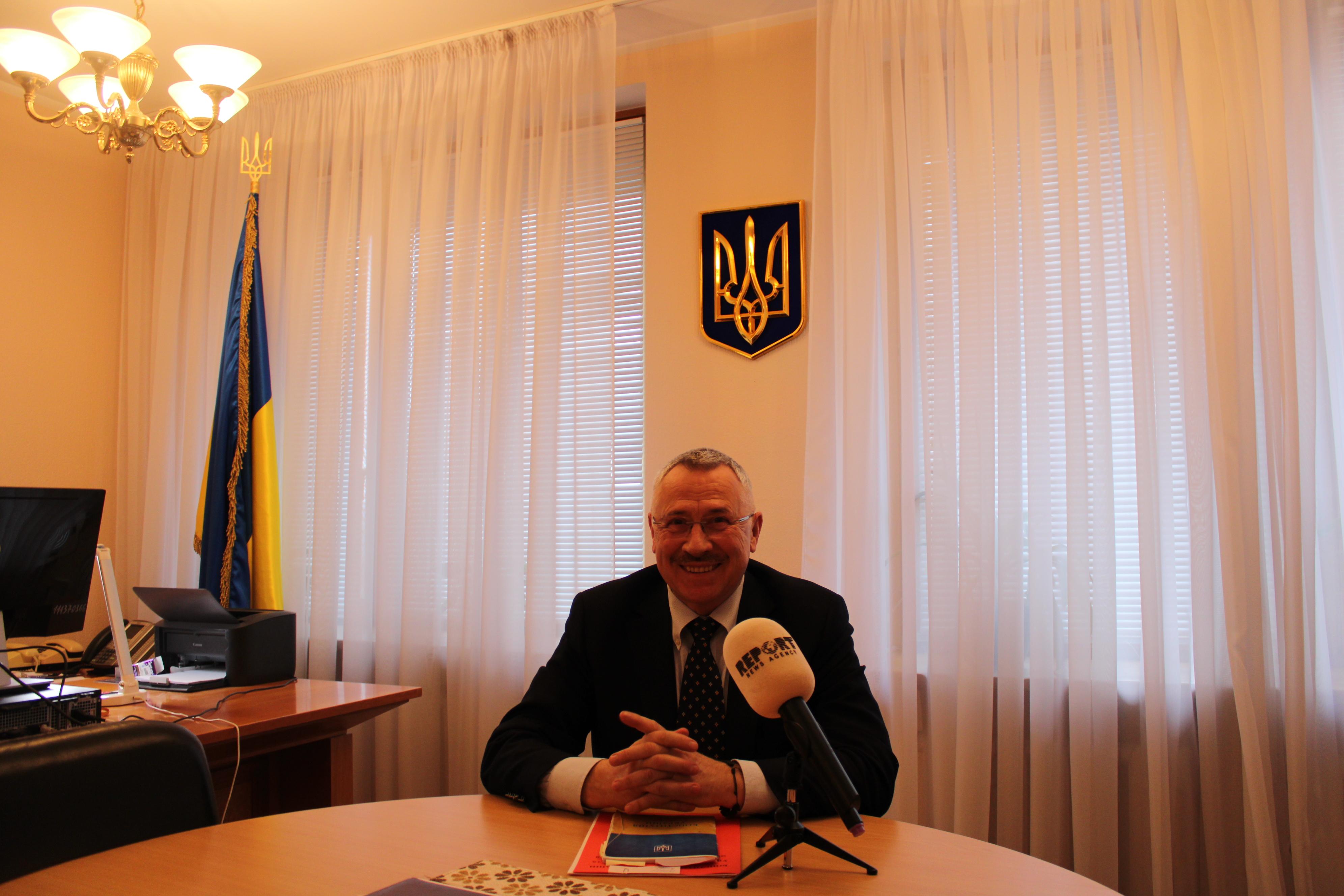
– У Конституційному Суді України немає подання щодо законодавчого регулювання цього питання, хоча Закон ухвалено. Зараз він на розгляді Венеційської комісії Ради Європи щодо відповідності європейським стандартам. До нас ще ніхто стосовно цього не звертався. Тож я не можу зараз сказати вам щось про це.
– Чи заплановано взагалі оновлення Конституції України за допомогою референдуму?
– Це питання також не може бути адресоване нам. Його розв`язувати – політикам: Президенту та депутатам.
– Але ви, як юрист, бачите у цьому потребу?
– Не можу зараз говорити з вами як юрист. Я не просто юрист – я на посаді судді КСУ. Але як один із авторів Конституції, ухваленої 1996 року, можу сказати, що не є прихильником цілком нової Конституції для України. Чинну Конституцію ми писали 5 років. Саме її і треба захищати! Україна досить довго була частиною імперії, яка сама не мала Конституції. Вперше в Росії Конституцію було ухвалено 1993 року. А перші Конституції у світі, що обмежують своєю появою всевладдя правителів, з'явилися у XVIII столітті у Франції та США. Наша чинна Конституція на 95 відсотків відповідає європейським стандартам. Над рештою треба працювати і поліпшувати, надавати їй цілком сучасного вигляду. Однак я категорично проти іншої Конституції для України. Це означало б, що нинішня наша Конституція є поганою. Адже це не так. Я прихильник удосконалення нашої національної цінності – Конституції 1996 року, а не створення нової. Ми маємо добру конституцію. Удосконалити її можна й потрібно, а створювати нову – немає необхідності. Тому що під виглядом нової можна втратити ті європейські цінності, які ми набули, ухваливши 1996 року ту, що діє зараз.
Acting Head of Ukraine’s Constitutional Court: I am against new Constitution
Eastern Europe bureau of Report presents an interview with
Acting Chairman of the Constitutional Court of Ukraine Serhiy Holovaty
 - Ukraine has announced the start of large-scale reforms. What international relations are used in the renewal of constitutional rights and constitutional reforms in this process?
- Ukraine has announced the start of large-scale reforms. What international relations are used in the renewal of constitutional rights and constitutional reforms in this process?
- The Constitutional Court is not a party to reforms. Since the Constitutional Court is not an institution of a political nature, but a judicial one, therefore it cannot be engaged in politics. The court doesn’t carry out any policy and cannot be a participant in the political reform process. We adopted the Constitution itself five years after the collapse of the USSR, i.e. in 1996. At that time, the political class and the intelligentsia were influenced by Soviet thinking and Soviet knowledge. Therefore, although they provided for the existence of such an institution as the Constitutional Court during the adoption of the Constitution in 1996, it was assigned a place in the section of the judiciary, despite that jurisdiction has nothing to do with the judiciary. The reform of the judiciary was carried out only 20 years later and the Constitutional Court was removed from the system of ordinary justice. Now it holds a separate position in the system of government and doesn’t belong to either the legislative, executive or judicial branches of government. Thus, the Constitutional Court is a special jurisdiction that exercises control over the activities and political institutions of power - the president, parliament, government, and also indirectly controls the quality of the products of the judiciary since 2016: under the constitutional jurisdiction, the Constitutional Court was given a new authority to consider individual complaints of citizens for violation of their rights just in those cases when they believe that the judiciary in all instances didn’t protect them. Thus, the Constitutional Court of Ukraine was reformed, its independence was strengthened, it was institutionally separated from the judiciary, it acquired more opportunities in the list of powers of constitutional jurisdiction, and, in accordance with these powers, carries out its activities without politically taking part in any reforms.
- Last year, Ukraine adopted its new economic national security strategy, which emphasizes the need for relations with five countries, including Azerbaijan, to be at the level of strategic partnership. What role does constitutional activity play in this cooperation?
- Constitutional courts work more as part of regional cooperation. We belong to the Conference of European Constitutional Courts. As part of this structure, there is an exchange of experience among national courts and we have the opportunity to borrow some experience. In any case, cooperation goes more through the European structure than on a bilateral basis. Each country has its own constitution and each side defends its own constitution.
We started cooperation with the Constitutional Court of Azerbaijan back in 1999. There were regular  meetings in Ukraine and Azerbaijan. In 2010, Chairman of the Constitutional Court of Ukraine Yurii Baulin took part in the events dedicated to the 15th anniversary of the Constitutional Court of Azerbaijan. He presented the Constitutional Court of Azerbaijan with a diploma of the Constitutional Court of Ukraine for his contribution to the development of our relations. In 2015, the Constitutional Court of Azerbaijan supported the Constitutional Court of Ukraine when a meeting of the chairmen of the Conference of European Constitutional Courts was held in Batumi. At that time, the Constitutional Court of Ukraine proposed the idea of adopting a declaration regarding the protection of the territorial integrity of their states. Then a joint statement was adopted, emphasizing that the Constitutional Courts shouldn’t remain indifferent when it comes to protecting the democratic rule of law, etc. Lithuania, Poland, Moldova, Cyprus and also Azerbaijan joined this statement.
meetings in Ukraine and Azerbaijan. In 2010, Chairman of the Constitutional Court of Ukraine Yurii Baulin took part in the events dedicated to the 15th anniversary of the Constitutional Court of Azerbaijan. He presented the Constitutional Court of Azerbaijan with a diploma of the Constitutional Court of Ukraine for his contribution to the development of our relations. In 2015, the Constitutional Court of Azerbaijan supported the Constitutional Court of Ukraine when a meeting of the chairmen of the Conference of European Constitutional Courts was held in Batumi. At that time, the Constitutional Court of Ukraine proposed the idea of adopting a declaration regarding the protection of the territorial integrity of their states. Then a joint statement was adopted, emphasizing that the Constitutional Courts shouldn’t remain indifferent when it comes to protecting the democratic rule of law, etc. Lithuania, Poland, Moldova, Cyprus and also Azerbaijan joined this statement.
- On what issues does the Constitutional Court of Ukraine receive the most complaints?
- Based on my observations, I can say that most complaints come in the field of social protection, especially in the field of pensions. Specifically, this applies to the disabled of the Chernobyl disaster. The legislator often changed the level of social protection (the amount of disability benefits), and Chernobyl disabled people sought protection from us. In some cases, the introduction of changes by the legislature, entailing a reduction in the social protection of persons with disabilities, is a violation of the Constitution. In many ways, the constitutional complaint was successful for this category of citizens, we were able to protect the disabled: after our decision, the legislature increased the pension benefits for Chernobyl victims to some extent. At the same time, not only people with disabilities come to us, but also civil servants, officials, prosecutors who are not satisfied with the amount of pensions. Without really delimiting the sectors, I must say that complaints about human rights violations in connection with the application of the norms of procedural codes by the courts are in second place in terms of the number of applications.
- Mr. Holovaty, in your opinion, are the constitutional rights of Ukrainian citizens fully protected? Are there any problems? If yes, what are they?
- The problem is to consider the complaint qualitatively and make a fair decision. I cannot assess the whole legal system. In 2016, as a result of the reform in Ukraine, a new institution of individual constitutional complaint was adopted. Only five years have passed, and we are trying to achieve our development on our own, to study what we base our decisions on. For example, we study the experience of the German Federal Constitutional Court. This is one of the oldest courts, 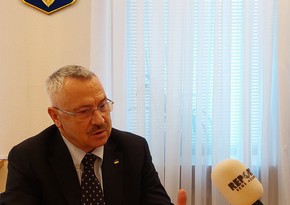 whose developments in the field of substantive law are very interesting. People got more opportunities in connection with the introduction of this institution of individual constitutional complaint. This is an additional tool. That’s because if they don’t find support in the judicial system, they come to us, and we make every effort to protect them. If we see a problem, we take on its solution. This is our main purpose and duty.
whose developments in the field of substantive law are very interesting. People got more opportunities in connection with the introduction of this institution of individual constitutional complaint. This is an additional tool. That’s because if they don’t find support in the judicial system, they come to us, and we make every effort to protect them. If we see a problem, we take on its solution. This is our main purpose and duty.
- Regarding what areas are there more contradictions in the legislation?
- We’re not an analytical center. We are not a legislative institution that studies legislation. We deal with individual complaints, as well as constitutional submissions with which we are addressed in particular by the President or deputies when a particular legal problem is discovered.
- We often read in the Ukrainian media that the problems of the oligarchy create serious obstacles for people, society and the country as a whole. How do you plan to solve this problem?
- This is a question that is beyond our powers.
- You want to say that Ukraine has no problems with the oligarchy?
- In the Constitutional Court of Ukraine there is no representation on the legislative regulation of this issue, although the Law has been adopted. Now it is under consideration by the Venice Commission of the Council of Europe for compliance with European standards. No one has contacted us about this yet. Therefore, I cannot tell you anything about this right now.
- Are there any plans to update the Constitution of Ukraine through a referendum?
- This question cannot be addressed to us, either. It is up to the politicians to decide: the president and the deputies.
- But do you, as a lawyer, see the need for this?
- I can’t talk to you now as a lawyer. I am not just a lawyer - I am a judge of the Constitutional Court. But as one of the authors of the Constitution adopted in 1996, I can say that I am not a supporter of a completely new Constitution for Ukraine. We have been writing the current Constitution for five years. That is what needs to be protected! Ukraine has been part of an empire for quite a long time, which itself did not have a Constitution.
For the first time in Russia, the Constitution was adopted in 1993. The first Constitutions in the world, limiting the omnipotence of rulers, appeared in the 18th century in France and the US. Our current Constitution is 95 percent in line with European standards. The rest part needs to be worked on and improved, bringing it into a completely modern look. But I am categorically against the second Constitution for Ukraine. This would mean that our current Constitution is bad. But this is not so. I am a supporter of the improvement of our national value - the Constitution of 1996, and not the creation of a new one. We have a good constitution. It can and should be improved, but there is no need for a new one. That’s because under the guise of a new one, it is possible to lose those European values that we acquired by adopting in 1996 the one that is in effect now.
LLC "REPORT-IA" (Report News Agency)
February 22, 2022

